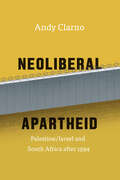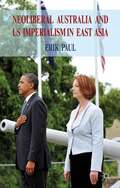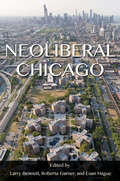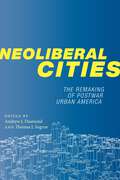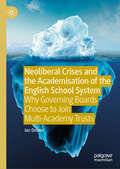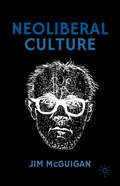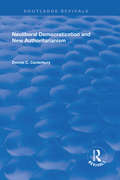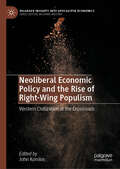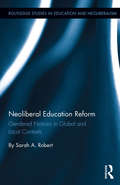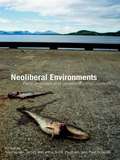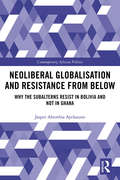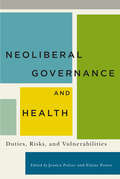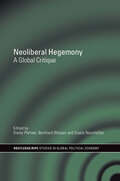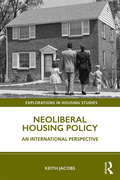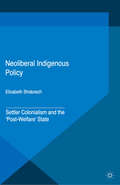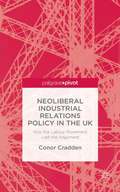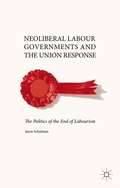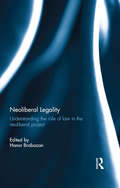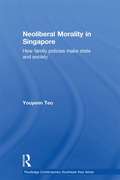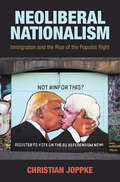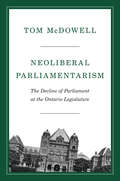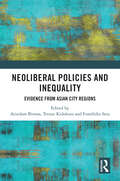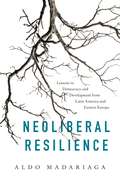- Table View
- List View
Neoliberal Apartheid: Palestine/Israel and South Africa after 1994
by Andy ClarnoIn recent years, as peace between Israelis and Palestinians has remained cruelly elusive, scholars and activists have increasingly turned to South African history and politics to make sense of the situation. In the early 1990s, both South Africa and Israel began negotiating with their colonized populations. South Africans saw results: the state was democratized and black South Africans gained formal legal equality. Palestinians, on the other hand, won neither freedom nor equality, and today Israel remains a settler-colonial state. Despite these different outcomes, the transitions of the last twenty years have produced surprisingly similar socioeconomic changes in both regions: growing inequality, racialized poverty, and advanced strategies for securing the powerful and policing the racialized poor. Neoliberal Apartheid explores this paradox through an analysis of (de)colonization and neoliberal racial capitalism. After a decade of research in the Johannesburg and Jerusalem regions, Andy Clarno presents here a detailed ethnographic study of the precariousness of the poor in Alexandra township, the dynamics of colonization and enclosure in Bethlehem, the growth of fortress suburbs and private security in Johannesburg, and the regime of security coordination between the Israeli military and the Palestinian Authority in the West Bank. The first comparative study of the changes in these two areas since the early 1990s, the book addresses the limitations of liberation in South Africa, highlights the impact of neoliberal restructuring in Palestine, and argues that a new form of neoliberal apartheid has emerged in both contexts.
Neoliberal Australia and US Imperialism in East Asia
by Erik PaulIn his critical analysis of the geopolitical economy of Australia, Erik Paul establishes causal links between the neoliberal state violence within society and Australia's external aggression as part of the US imperial project in Asia. Australia plays a major role in the urban and industrial transformation of East Asia, as a key provider of the region's needs for minerals, energy and food, but is largely dependent on Anglo-American investments for its export income and economic growth, as well as social wellbeing and cohesion. With US strategy aiming for a regime change in China and Australia's future as a nation state closely linked to the US national interest and ruling elite, the author is forced to question whether Australia should move away from the profoundly anti-democratic nature of neoliberalism by reclaiming the state for the common good.
Neoliberal Chicago
by Euan Hague Larry Bennett Roberta GarnerThe neoliberal philosophy of fiscal austerity aligned with reduced regulation has transformed Chicago. As pursued by mayor Rahm Emanuel and his predecessor Richard M. Daley, neoliberalism led officials to privatize everything from parking meters to schools, gut regulations and social services, and promote gentrification wherever possible. The essayists in Neoliberal Chicago explore an essential question: how does neoliberalism work on the ground in today's Chicago? Contextual chapters explore race relations, physical development, and why Chicago embraced neoliberalism. Other contributors delve into aspects of the neoliberal vision, neoliberalism's impact on three iconic city spaces, and how events like the 2008 foreclosure crisis and the bid to attract the Olympic Games reveal the workings of neoliberalism. Contributors: Stephen Alexander, Larry Bennett, Michael Bennett, Carrie Breitbach, Sean Dinces, Kenneth Fidel, Roberta Garner, Euan Hague, Black Hawk Hancock, Christopher Lamberti, Michael J. Lorr, Martha Martinez, Brendan McQuade, Alex G. Papadopoulos, Rajiv Shah, Costas Spirou, Carolina Sternberg, and Yue Zhang.
Neoliberal Cities: The Remaking of Postwar Urban America (NYU Series in Social and Cultural Analysis #9)
by Thomas J. Sugrue Andrew J. DiamondTraces decades of troubled attempts to fund private answers to public urban problemsThe American city has long been a laboratory for austerity, governmental decentralization, and market-based solutions to urgent public problems such as affordable housing, criminal justice, and education. Through richly told case studies from Boston, Chicago, Cleveland, Los Angeles, New Orleans, and New York, Neoliberal Cities provides the necessary context to understand the always intensifying racial and economic inequality in and around the city center. In this original collection of essays, urban historians and sociologists trace the role that public policies have played in reshaping cities, with particular attention to labor, the privatization of public services, the collapse of welfare, the rise of gentrification, the expansion of the carceral state, and the politics of community control. In so doing, Neoliberal Cities offers a bottom-up approach to social scientific, theoretical, and historical accounts of urban America, exploring the ways that activists and grassroots organizations, as well as ordinary citizens, came to terms with new market-oriented public policies promoted by multinational corporations, financial institutions, and political parties. Neoliberal Cities offers new scaffolding for urban and metropolitan change, with attention to the interaction between policymaking, city planning, social movements, and the market.
Neoliberal Crises and the Academisation of the English School System: Why Governing Boards Choose to Join Multi-Academy Trusts
by Ian DewesThis book examines the impact of neoliberalism on the academisation of the English school system. The growth of multi-academy trusts (MATs) has been a significant change in the English educational landscape. While some schools have been forced to join MATs, many of them have made this change because their governing board has chosen to do so. The author of this book examines the reasons why many governing bodies have still decided to join a MAT, despite numerous controversies linked to them. He applies the theory that neoliberalism perpetuates itself by creating crises which require more neoliberal policy solutions. Using three case-study schools, the extent to which various crises in the English education system have encouraged governing boards to join MATs is studied. The book will be of interest to academics and students of education policy, schooling, and the sociology of education.
Neoliberal Culture
by Jim McGuiganNeoliberal Culture presents a critical analysis of the impact of the global free-market - the hegemony of which has been described elsewhere by the author as 'a short counter-revolution' - on the arts, media and everyday life since the 1970s.
Neoliberal Democratization and New Authoritarianism (Routledge Revivals)
by Dennis C. CanterburyOriginally published in 2005. Domestic and foreign economic and political policies in the rich capitalist nations in the North and in the poor countries in the South are geared towards globalization and democratization. Indeed the dominant view held by countries in the North is that globalization leads to democracy and vice versa, and that in turn economic development will result from that process. Thus many scarce resources are allocated to bring about globalization and democracy. Exploring the dynamics of change that allow for the persistence of authoritarian states in the Third World, this illuminating book highlights certain aspects of democratization that have not been investigated fully. Anyone interested in development politics and political sociology will draw a plethora of important theoretical insights into globalization, authoritarianism and transition/democratization from this original study.
Neoliberal Economic Policy and the Rise of Right-Wing Populism: Western Civilization at the Crossroads (Palgrave Insights into Apocalypse Economics)
by John KomlosThis edited volume explores and makes explicit the links between neoliberal economic policies and right-wing ideology. The book focuses on the case of the US while situating these trends in the global political economy. The book brings together contributions from an interdisciplinary perspective, integrating economics, political science and sociology to examine the connections between the economic precarity generated by neoliberalism and the rise of the far right. The book argues that the creation of a flawed capitalist system has left a vacuum in policymakers’ ability to understand the impact of economic policies on human welfare and mental health, and can be directly linked to a right-wing populist movement driven by the frustrations associated with the transition from an industrial to a post-industrial economy. Chapters consider the history of neoliberalism and comparative studies of socio-economic conditions, before tackling specific issues associated with neoliberal policy, such as the demise of unions, the decline in manufacturing jobs, the gig economy, trickle-down economics, income inequality and the rise of elites in America. This book will be of interest to a broad range of readers, including those in politics, economics, sociology, industrial organization and labour studies.
Neoliberal Education Reform: Gendered Notions in Global and Local Contexts (Routledge Studies in Education, Neoliberalism, and Marxism)
by Sarah A. RobertThe restructuring of teaching is a global issue, the result of a transnational movement of policy. Gender shapes the occupational reform and binds the global-to-the-local movement of reform ideas. Gender is also implicated in how policy is done and how it leads to particular outcomes. This volume examines the behind-the-scenes work done to make sense of reform and implement it during the workday and questions the new forms and controls over teaching reforms—the labor process—revealed to understand the implications of neoliberal education reform on teachers’ work. Based on ethnographic research undertaken at public high schools in Argentina, this volume introduces the everyday work lives of teachers. It includes interviews and observations revealing what it means to be a teacher in the reform context, and explores the ways masculinities and femininities shape teachers’ decision-making about reforms. At a time when teachers are at the center of political controversy around the world, this volume is an important reminder that school change is about changing the work of teachers.
Neoliberal Environments: False Promises and Unnatural Consequences
by Paul Robbins Nik Heynen James McCarthy Scott PrudhamThis volume explores the nexus between nature, markets, deregulation and valuation, using theoretically sharp and empirically rich real-world case studies and analyses of actually existing policy from around the world and across a range of resources. In short, it answers the questions: does neoliberalizing nature work and what work does it do? More specifically, this volume provides answers to a series of urgent questions about the effects of neoliberal policies on environmental governance and quality. What are the implications of privatizing public water utilities in terms of equity in service provision, resource conservation and water quality? Do free trade agreements erode the sovereignty of nations and citizens to regulate environmental pollution, and is this power being transferred to corporations? What does the evidence show about the relationship between that marketization and privatization of nature and conservation objectives? Neoliberal Environments productively engages with all of these questions and more. At the same time, the diverse case studies collectively and decisively challenge the orthodoxies of neoliberal reforms, documenting that the results of such reforms have fallen far short of their ambitions.
Neoliberal Globalisation and Resistance from Below: Why the Subalterns Resist in Bolivia and not in Ghana (Contemporary African Politics)
by Jasper Abembia AyelazunoAs bearers of their own emancipation, the political agency of the subaltern classes is a vexed question, a time-honoured one at that. Why do the subalterns endure injustices without revolting most of the time, but revolt sometimes against some injustices? The euphoria of ’globalisation-from-below’, this book argues, skirts responsibility of addressing this question by presuming a groundswell of resistance across the world against neoliberal globalisation. In contrast to this oeuvre, Neoliberal Globalisation and Resistance from Below engages this question squarely by using the socio-historical approach to explain why the subalterns resist neoliberal globalisation in Bolivia and not in Ghana. The author urges scholars of critical political economy to pay greater attention to why the subalterns resist, rather than how they resist, or what the ideal end of their resistance should be. Such refocusing of the research and political lens will yield a more realistic picture of what is politically possible in the social context of peripheral capitalism regarding an anti-capitalist revolution. The author further argues that this refocusing will cure many of the romantic anti-capitalist claims and banal wishful thinking of a socialist revolution in peripheral capitalist regions such as Latin American, The Middle East and North Africa (MENA), and Sub-Saharan Africa. Neoliberal Globalisation and Resistance from Below will be of interest to students and scholars of African politics, neoliberalism, globalisation, political economy and subaltern politics.
Neoliberal Governance and Health: Duties, Risks, and Vulnerabilities
by Elaine Polzer Jessica PolzerProvoking urgent questions about the politics of health in the twenty-first century, this collection interrogates how neoliberal approaches to governance frame health and risk in ways that promote individual responsibility and the implications of such framings for the well-being of the collective. The essays examine a range of important issues, including childhood obesity, genetic testing, HPV vaccination, Aboriginal health, pandemic preparedness, environmental health, disability policy, aging, contingent work, and women's access to social services. With specific attention to the Canadian context, contributors reveal how neoliberal practices and policies shape the health experiences of individuals, disadvantaged groups, and communities by cultivating self-discipline while further exposing to harm the lives and bodies of those already marginalized in consumer society. Building on the theoretical conceptualizations of power and government of French philosopher Michel Foucault, the case studies extend our understanding of the effects of neoliberal practices and policies in relation to social class, gender, racialized identity, colonization, and ability, and provide insight into how health-related discourse creates new requirements for citizenship and forms of social stratification. A timely intervention in the field of health studies, Neoliberal Governance and Health establishes the need for critical interdisciplinary scholarship to counter the individualizing and marginalizing tendencies of health-related policy, practice and research.
Neoliberal Governance and Health: Duties, Risks, and Vulnerabilities
by Jessica PolzerProvoking urgent questions about the politics of health in the twenty-first century, this collection interrogates how neoliberal approaches to governance frame health and risk in ways that promote individual responsibility and the implications of such framings for the well-being of the collective. The essays examine a range of important issues, including childhood obesity, genetic testing, HPV vaccination, Aboriginal health, pandemic preparedness, environmental health, disability policy, aging, contingent work, and women’s access to social services. With specific attention to the Canadian context, contributors reveal how neoliberal practices and policies shape the health experiences of individuals, disadvantaged groups, and communities by cultivating self-discipline while further exposing to harm the lives and bodies of those already marginalized in consumer society. Building on the theoretical conceptualizations of power and government of French philosopher Michel Foucault, the case studies extend our understanding of the effects of neoliberal practices and policies in relation to social class, gender, racialized identity, colonization, and ability, and provide insight into how health-related discourse creates new requirements for citizenship and forms of social stratification. A timely intervention in the field of health studies, Neoliberal Governance and Health establishes the need for critical interdisciplinary scholarship to counter the individualizing and marginalizing tendencies of health-related policy, practice and research.
Neoliberal Hegemony and the Pink Tide in Latin America
by Tom ChodorThe book examines the 'Pink Tide' of leftist governments in Latin America struggling against neoliberal hegemony from a critical International Political Economy perspective. Focusing particularly on Venezuela and Brazil, it evaluates the transformative and emancipatory potentials of their political projects domestically, regionally and globally.
Neoliberal Hegemony: A Global Critique (RIPE Series in Global Political Economy)
by Dieter Plehwe Bernhard J. A. Walpen Gisela NeunhöfferNeoliberalism is fast becoming the dominant ideology of our age, yet politicians, businessmen and academics rarely identify themselves with it and even political forces critical of it continue to carry out neoliberal policies around the globe. How can we make sense of this paradox? Who actually are "the neoliberals"? This is the first explanation of neoliberal hegemony, which systematically considers and analyzes the networks and organizations of around 1.000 self conscious neoliberal intellectuals organized in the Mont Pèlerin Society. This book challenges simplistic understandings of neoliberalism. It underlines the variety of neoliberal schools of thought, the various approaches of its proponents in the fight for hegemony in research and policy development, political and communication efforts, and the well funded, well coordinated, and highly effective new types of knowledge organizations generated by the neoliberal movement: partisan think tanks. It also closes an important gap in the growing literature on "private authority’’, presenting new perspectives on transnational civil society formation processes. This fascinating new book will be of great interest to students of international relations, political economy, globalization and politics.
Neoliberal Housing Policy: An International Perspective (Explorations in Housing Studies)
by Keith JacobsNeoliberal Housing Policy considers some of the most significant housing issues facing the West today, including the increasing commodification of housing; the political economy surrounding homeownership; the role of public housing; the problem of homelessness; the ways that housing accentuates social and economic inequality; and how suburban housing has transformed city life. The empirical focus of the book draws mainly from the US, UK and Australia, with examples to illustrate some of the most important features and trajectories of late capitalism, including the commodification of welfare provision and financialisation, while the examples from other nations serve to highlight the influence of housing policy on more regional- and place-specific processes. The book shows that developments in housing provision are being shaped by global financial markets and the circuits of capital that transcend the borders of nation states. Whilst considerable differences within nation states exist, many government interventions to improve housing often fall short. Adopting a structuralist approach, the book provides a critical account of the way housing policy accentuates social and economic inequalities and identifies some of the significant convergences in policy across nations states, ultimately offering an explanation as to why so many ‘inequalities’ endure. It will be useful for anyone in professional housing management/social housing programmes as well as planning, sociology (social policy), human geography, urban studies and housing studies programmes.
Neoliberal Indigenous Policy: Settler Colonialism and the ‘Post-Welfare’ State
by Elizabeth StrakoschThis book examines recent changes to Indigenous policy in English-speaking settler states, and locates them within the broader shift from social to neo-liberal framings of citizen-state relations via a case study of Australian federal policy between 2000 and 2007.
Neoliberal Industrial Relations Policy in the UK: How the Labour Movement Lost the Argument
by Conor CraddenFrom attempts to control inflation in the 1970s, through the reforms of the Thatcher years, to the rise and fall of New Labour, this book shows how different theories and conceptual models have been critical to the development of industrial relations in the UK.
Neoliberal Labour Governments and the Union Response
by Jason SchulmanExploring divergences in the choice of neoliberal policies by labour party governments in New Zealand, Australia, and Britain, this book challenges common explanations of the embrace of neoliberalism by social democratic parties. It argues that the diminishing influence of labour unions within these parties is the result of a lack of strategy on the part of the union movement itself. Be it due to a lack of interest by the unions in engaging in politics or a passivity resulting from years of anti-union Conservative rule, Union interests particularly in New Zealand and Great Britain have been neglected by party leadership when formulating policies. In contrast, it poses the Australian example as one in which the unions were sufficiently united, disciplined, and strategically minded to ensure that a Labor Party government integrated them into the making of policy. The book lays bare the Australasian "roots" of Britain's New Labour era. In an age in which the macroeconomic, industrial, and social policies of social democratic parties have so often moved to the right, this book asks the question: how can trade unions retain some measure of control over the policies of the parties that are ostensibly theirs.
Neoliberal Legality: Understanding the Role of Law in the Neoliberal Project
by Honor BrabazonNeoliberalism has been studied as a political ideology, an historical moment, an economic programme, an institutional model, and a totalising political project. Yet the role of law in the neoliberal story has been relatively neglected, and the idea of neoliberalism as a juridical project has yet to be considered. That is: neoliberal law and its interrelations with neoliberal politics and economics has remained almost entirely neglected as a subject of research and debate. This book provides a systematic attempt to develop a holistic and coherent understanding of the relationship between law and neoliberalism. It does not, however, examine law and neoliberalism as fixed entities or as philosophical categories. And neither is its objective to uncover or devise a ‘law of neoliberalism’. Instead, it uses empirical evidence to explore and theorise the relationship between law and neoliberalism as dynamic and complex social phenomena. Developing a nuanced concept of ‘neoliberal legality’, neoliberalism, it is argued here, is as much a juridical project as a political and economic one. And it is only in understanding the juridical thrust of neoliberalism that we can hope to fully comprehend the specificities, and continuities, of the neoliberal period as a whole.
Neoliberal Morality in Singapore: How family policies make state and society (Routledge Contemporary Southeast Asia Series)
by Youyenn TeoUsing the case study of Singapore, this book examines the production of a set of institutionalized relationships and ethical meanings that link citizens to each other and the state. It looks at how questions of culture and morality are resolved, and how state-society relations are established that render paradoxes and inequalities acceptable, and form the basis of a national political culture. The Singapore government has put in place a number of policies to encourage marriage and boost fertility that has attracted much attention, and are often taken as evidence that the Singapore state is a social engineer. The book argues that these policies have largely failed to reverse demographic trends, and reveals that the effects of the policies are far more interesting and significant. As Singaporeans negotiate various rules and regulations, they form a set of ties to each other and to the state. These institutionalized relationships and shared meanings, referred to as neoliberal morality, render particular ideals about family natural. Based on extensive field work, the book is a useful contribution to studies on Asian Culture and Society, Globalisation, as well as Development Studies.
Neoliberal Nationalism: Immigration and the Rise of the Populist Right
by Christian JoppkeThe Brexit and Trump shocks of 2016 mark a deep caesura in the history of liberal societies. It is no longer sufficient, if it ever was, to look at Western states` immigration and citizenship policies through the single lens of advancing liberalism. Instead, two additional forces need to be reckoned with: a new nationalism, but also the neoliberal restructuring of state and society in which it is generated. Joppke demonstrates that many of the new policies have their roots in neoliberalism rather than the new nationalism. Moreover, some of them, such as 'earned citizenship', are the product of neoliberalism and nationalism working in tandem, in terms of a neoliberal nationalism. The neoliberalism-nationalism nexus is complex, its elements sometimes opposing but sometimes complementing or even constituting one another. This topical book will appeal to students and scholars of populism, nationalism, and immigration and citizenship, across comparative politics, sociology and political theory.
Neoliberal Parliamentarism: The Decline of Parliament at the Ontario Legislature
by Tom McDowellIn Neoliberal Parliamentarism, Tom McDowell provides an alternative approach to understanding the decline of parliament at the Ontario legislature, an approach that highlights the politics of neoliberalism and the significant impact it has had over the last four decades. McDowell offers a structural critique of parliament, claiming that restrictions on the legislature cannot be separated from the ascendance of neoliberalism as the dominant social and policy paradigm in the province. Tracking the evolution of procedure at the Ontario Legislature from 1981 to 2021, McDowell shows that, beginning in the early 1980s, the establishment of increasingly restrictive procedural rules was critical in securing the passage of controversial neoliberal restructuring policies. Further, he argues that the decades-long shift towards de-democratization and the concentration of political power in the executive ought to be understood in the context of neoliberalism’s rejection of parliamentary sovereignty and legal positivism. As an in-depth study of the implementation of neoliberalism policy on the political apparatus of Ontario, Neoliberal Parliamentarism is critical reading for scholars and students interested in the relationship between neoliberalism and de-democratization, the politics of Ontario, and parliamentary procedure more broadly.
Neoliberal Policies and Inequality: Evidence from Asian City Regions
by Arindam Biswas, Tetsuo Kidokoro and Fumihiko SetaThis book explores the discourse on urban and regional inequality within the framework of neoliberalism. It analyzes the widespread application of neoliberal policies in Asian city regions and identifies their influence on rising inequality. The book captures inequality through spatial and non-spatial policy narratives with empirical evidence from India, Japan, South Korea, Taiwan, and Thailand. The book uses analytics, narratives and simulation to unfold the opportunities and threats to urban regions that bear the impacts of globalization and neoliberal policies.Lucid and topical, this book will be an essential read for scholars and researchers of urban economics, urban and regional planning, urban studies, urban sociology, political economy, public policy, governance, development studies and Asian economy.
Neoliberal Resilience: Lessons in Democracy and Development from Latin America and Eastern Europe
by Aldo MadariagaAn exploration of the factors behind neoliberalism’s resilience in developing economies and what this could mean for democracy’s futureSince the 1980s, neoliberalism has withstood repeated economic shocks and financial crises to become the hegemonic economic policy worldwide. Why has neoliberalism remained so resilient? What is the relationship between this resiliency and the backsliding of Western democracy? Can democracy survive an increasingly authoritarian neoliberal capitalism? Neoliberal Resilience answers these questions by bringing the developing world’s recent history to the forefront of our thinking about democratic capitalism’s future.Looking at four decades of change in four countries once considered to be leading examples of effective neoliberal policy in Latin America and Eastern Europe—Argentina, Chile, Estonia, and Poland—Aldo Madariaga examines the domestic actors and institutions responsible for defending neoliberalism. Delving into neoliberalism’s political power, Madariaga demonstrates that it is strongest in countries where traditional democratic principles have been slowly and purposefully weakened. He identifies three mechanisms through which coalitions of political, institutional, and financial forces have propagated neoliberalism’s success: the privatization of state companies to create a supporting business class, the use of political institutions to block the representation of alternatives in congress, and the constitutionalization of key economic policies to shield them from partisan influence. Madariaga reflects on today’s most pressing issues, including the influence of increasing austerity measures and the rise of populism.A comparative exploration of political economics at the peripheries of global capitalism, Neoliberal Resilience investigates the tensions between neoliberalism’s longevity and democracy’s gradual decline.
